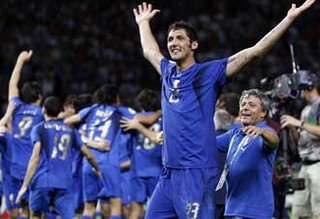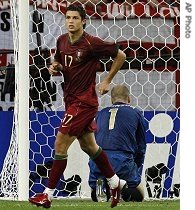
To the very end of his career, Zinedine Zidane could dictate the flow of play with rare skill and elegant control of the ball.
In the World Cup final, Zidane lost control of his temper.
The parting image for the France captain will forever be him rearing back in anger, lowering his head and launching his bald crown into the chest of Italy defender Marco Materazzi after the two exchanged words while walking down the field in extra time Sunday.
The game was tied 1-1 when Zidane was given a red card in the 110th minute. Without their sharpshooting captain, the French couldn't unlock Italy's defense and went on to lose in a shootout, 5-3.
"Zidane being sent off changed everything," France coach Raymond Domenech said. "Even in extra time the Italian team was waiting for only one thing, and that was penalties."
Domenech said he did not know what Materazzi said to Zidane.
"It's regrettable," Domenech said. "We regret it, he regrets it."
The strike to the center of Materazzi's chest was clearly intentional, and referee Horacio Elizondo of Argentina briefly consulted with his assistants before showing Zidane the 28th red card of the tournament, a World Cup record. The previous record of 22 red cards, set in 1998, was broken before the quarterfinals round began.
"I have not seen the replays, but if it's voluntary then there's nothing you can say," Domenech said. "But it's a shame. It's sad."
Head bowed, Zidane walked past Domenech but did not look at him. As he exited into the tunnel, his head still bent to the ground, he strode past the golden World Cup trophy and disappeared.
Zidane, whose sparkling play led the French to the 1998 title and carried them much deeper into this tournament than expected, previously said he would quit the game at the end of the World Cup.
Earlier in Sunday's match, he gave France a 1-0 lead with a seventh-minute penalty kick -- his 31st goal for France and third in a World Cup final.
Zidane was treated for what appeared to be a shoulder injury in the 80th minute; trainers took him off but he returned, holding his right arm awkwardly and wincing in pain.

Minutes before Zidane was sent off, France striker Thierry Henry was taken out in favor of Sylvain Wiltord. Early in the game, Henry bumped his head in a collision and crumpled to the ground, then went briefly to the sideline but returned.
A player of uncommon skill and technical poise, Zidane's command of almost any ball, his vision and penchant for big-game goals has earned him comparisons to the greatest creative talents in soccer.
His temper has been another matter.
Playing for Juventus five years ago, Zidane butted Jochen Kientz of Hamburger SV in a Champions League match, also earning a red card.
Eight years ago, Zidane was red-carded for stomping on an opponent while playing Saudi Arabia. At this World Cup he collected two yellow cards and was suspended for France's third group match against Togo.
On Sunday, his penalty kick got France off to a fast start. He chipped the kick into the air and goalkeeper Gianluigi Buffon dived to his right. The ball sailed over Buffon, hit the underside of the crossbar and dropped over the line.
Zidane raised an arm in the air as coolly as he had taken the kick.
It was Zidane's 31st goal for Les Bleus in 108 appearances, and fifth in the World Cup. He also scored a second straight penalty after notching the winner in the semifinal match against Portugal and had two goals in the 1998 World Cup final when France beat Brazil 3-0.
He almost scored a late goal Sunday in the first half of extra time, but Buffon tipped his powerful header over the bar.

France's success at this year's World Cup had much to do with the now-retired Zidane, including a penalty kick against Portugal in the semifinal. Taking two steps, Zidane sent the ball into the bottom left corner, just out of the reach of Portugal goalkeeper Ricardo Pereira.
Zidane also scored in the second-round win over Spain, a typically skillful goal which saw him cut inside a defender and then beat goalkeeper Iker Casillas.
Against Brazil in the quarterfinal, Zidane played as well as he ever has. His precise passes split Brazil's defense, his fakes sent players the wrong way, and he even twice pointed one way as if to indicate the direction of his pass and then turned around sharply in his signature spin move.
So much for those pre-tournament reports that Zidane had lost his edge, which privately are believed to have infuriated him to the point of snubbing the press.
Reports of his hot temper, however, cannot be denied now.












